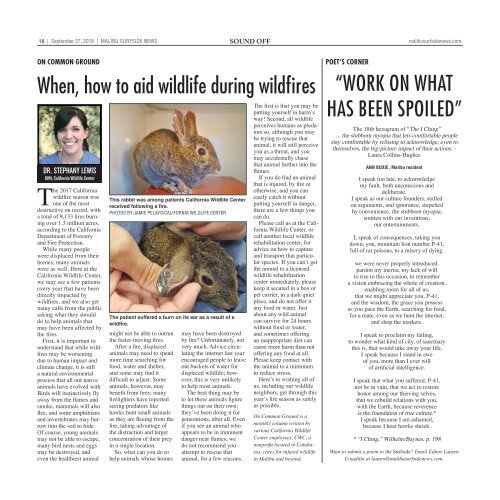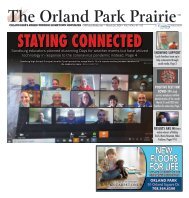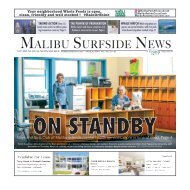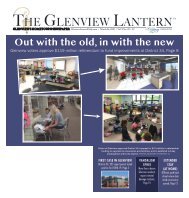MSN_092718
Create successful ePaper yourself
Turn your PDF publications into a flip-book with our unique Google optimized e-Paper software.
18 | September 27, 2018 | Malibu surfside news sound off<br />
malibusurfsidenews.com<br />
On Common Ground<br />
When, how to aid wildlife during wildfires<br />
Dr. Stephany Lewis<br />
DVM, California Wildlife Center<br />
The 2017 California<br />
wildfire season was<br />
one of the most<br />
destructive on record, with<br />
a total of 9,133 fires burning<br />
over 1.3 million acres,<br />
according to the California<br />
Department of Forestry<br />
and Fire Protection.<br />
While many people<br />
were displaced from their<br />
homes, many animals<br />
were as well. Here at the<br />
California Wildlife Center,<br />
we may see a few patients<br />
every year that have been<br />
directly impacted by<br />
wildfires, and we also get<br />
many calls from the public<br />
asking what they should<br />
do to help animals that<br />
may have been affected by<br />
the fires.<br />
First, it is important to<br />
understand that while wildfires<br />
may be worsening<br />
due to human impact and<br />
climate change, it is still<br />
a natural environmental<br />
process that all our native<br />
animals have evolved with.<br />
Birds will instinctively fly<br />
away from the flames and<br />
smoke, mammals will also<br />
flee, and some amphibians<br />
and invertebrates may burrow<br />
into the soil to hide.<br />
Of course, young animals<br />
may not be able to escape,<br />
many bird nests and eggs<br />
may be destroyed, and<br />
even the healthiest animal<br />
This rabbit was among patients California Wildlife Center<br />
received following a fire.<br />
Photos by Jamie Pelayo/California Wildlife Center<br />
The patient suffered a burn on its ear as a result of a<br />
wildfire.<br />
might not be able to outrun<br />
the faster-moving fires.<br />
After a fire, displaced<br />
animals may need to spend<br />
more time searching for<br />
food, water and shelter,<br />
and some may find it<br />
difficult to adjust. Some<br />
animals, however, may<br />
benefit from fires; many<br />
firefighters have reported<br />
seeing predators like<br />
hawks hunt small animals<br />
as they are fleeing from the<br />
fire, taking advantage of<br />
the distraction and larger<br />
concentration of their prey<br />
in a single location.<br />
So, what can you do to<br />
help animals whose homes<br />
may have been destroyed<br />
by fire? Unfortunately, not<br />
very much. Advice circulating<br />
the internet last year<br />
encouraged people to leave<br />
out buckets of water for<br />
displaced wildlife; however,<br />
this is very unlikely<br />
to help most animals.<br />
The best thing may be<br />
to let these animals figure<br />
things out on their own;<br />
they’ve been doing it for<br />
generations, after all. Even<br />
if you see an animal who<br />
appears to be in imminent<br />
danger near flames, we<br />
do not recommend you<br />
attempt to rescue that<br />
animal, for a few reasons.<br />
The first is that you may be<br />
putting yourself in harm’s<br />
way! Second, all wildlife<br />
perceives humans as predators<br />
so, although you may<br />
be trying to rescue that<br />
animal, it will still perceive<br />
you as a threat, and you<br />
may accidentally chase<br />
that animal further into the<br />
flames.<br />
If you do find an animal<br />
that is injured, by fire or<br />
otherwise, and you can<br />
easily catch it without<br />
putting yourself in danger,<br />
there are a few things you<br />
can do.<br />
Please call us at the California<br />
Wildlife Center, or<br />
call another local wildlife<br />
rehabilitation center, for<br />
advice on how to capture<br />
and transport that particular<br />
species. If you can’t get<br />
the animal to a licensed<br />
wildlife rehabilitation<br />
center immediately, please<br />
keep it secured in a box or<br />
pet carrier, in a dark quiet<br />
place, and do not offer it<br />
any food or water. Just<br />
about any wild animal<br />
can survive for 24 hours<br />
without food or water,<br />
and sometimes offering<br />
an inappropriate diet can<br />
cause more harm than not<br />
offering any food at all.<br />
Please keep contact with<br />
the animal to a minimum<br />
to reduce stress.<br />
Here’s to wishing all of<br />
us, including our wildlife<br />
neighbors, get through this<br />
year’s fire season as safely<br />
as possible.<br />
On Common Ground is a<br />
monthly column written by<br />
various California Wildlife<br />
Center employees. CWC, a<br />
nonprofit located in Calabasas,<br />
cares for injured wildlife<br />
in Malibu and beyond.<br />
Poet’s Corner<br />
“Work on What<br />
Has Been Spoiled”<br />
The 18th hexagram of “The I Ching”<br />
... the stubborn myopia that lets comfortable people<br />
stay comfortable by refusing to acknowledge, even to<br />
themselves, the big-picture impact of their actions. -<br />
Laura Collins-Hughes<br />
Ann Buxie, Malibu resident<br />
I speak too late, to acknowledge<br />
my fault, both unconscious and<br />
deliberate.<br />
I speak as our culture founders, stalled<br />
on arguments, and ignorance, stupefied<br />
by convenience, the stubborn myopia,<br />
smitten with our inventions,<br />
our entertainments.<br />
I, speak of consequences, taking you<br />
down, you, mountain lion number P-41,<br />
full of rat poisons, to a misery of dying.<br />
we were never properly introduced.<br />
pardon my inertia, my lack of will<br />
to rise to this occasion, to remember<br />
a vision embracing the whole of creation,<br />
enabling room for all of us,<br />
that we might appreciate you, P-41,<br />
and the wisdom, the grace you possess<br />
as you pace the Earth, searching for food,<br />
for a mate, even as we hunt the internet,<br />
and shop the markets.<br />
I speak to proclaim my failing,<br />
to wonder what kind of city, of sanctuary<br />
this is, that would take away your life.<br />
I speak because I stand in awe<br />
of you, more than I ever will<br />
of artificial intelligence.<br />
I speak that what you suffered, P-41,<br />
not be in vain, that we act to restore<br />
honor among our thieving selves,<br />
that we rebuild relations with you,<br />
with the Earth, because reverence<br />
is the foundation of true culture.*<br />
I speak because I am ashamed,<br />
because I hear hawks shriek.<br />
* “I Ching,” Wilhelm/Baynes, p. 198<br />
Want to submit a poem to the Surfside? Email Editor Lauren<br />
Coughlin at lauren@malibusurfsidenews.com.


















